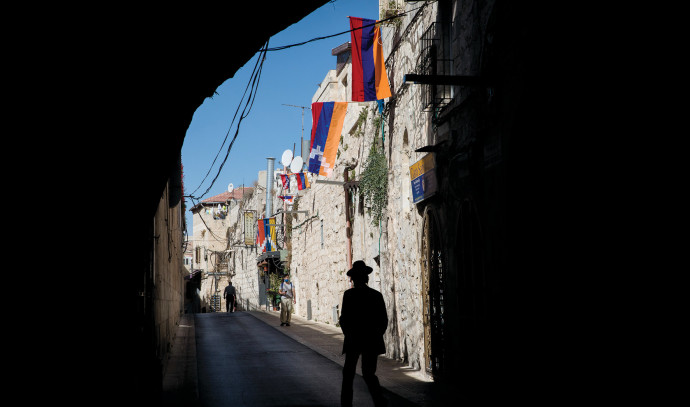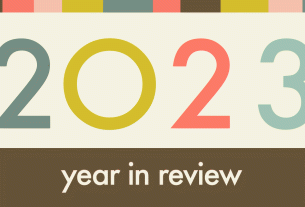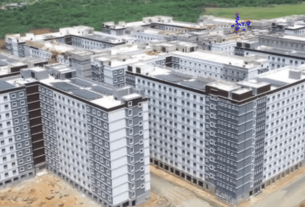The developer who leased a large portion of the Armenian Quarter has presented to the Jerusalem Municipality a concept for a luxury hotel complex that would encompass 10 to 20% of Armenian land with the potential to tack on “adjacent” properties during the duration of the lease.
Details of the contract between the Armenian patriarch and Xana Gardens Ltd. were made public for the first time during the presentation on Friday of a fact-finding report by a team of international lawyers from the United States and Armenia.
Audible groans rippled through the main square of the Armenian Convent as Setrag Balian, one of the activists opposing the deal, read the report’s conclusions during a press conference. Residents lingered after the presentation to pore through the information, which included a copy of the contract that shows what appears to be an altered date.
If this lease goes through, many fear it will forever alter the Armenian and Christian presence in Jerusalem.
“I feel betrayed,” Serop Sahagian told The Media Line. “It’s against us and our interests, but this has all been done by those idiots, one of whom is called the patriarch.”
He fears the company, Xana, is a front for a Jewish organization that seeks Old City land.
“We are at a very dangerous crossroads,” Sahagian said. “I hope we can survive this. Our community activities are in real danger. We cannot have any community activities if we don’t have a parking lot—the school and our clubs will be under real pressure.”
The true price of building
The plan presented to City Hall calls for a sprawling luxury hotel complex, managed by the exclusive One&Only chain, between 14,000 and 16,000 square meters (3.5 to 4 acres), well beyond the 11,500 square meters mentioned in the contract. The parking lot alone is 7,000 square meters.
This would mean the eviction of residents, businesses, and the Armenians’ seminary hall.
The lease in question is a 49-year contract for the Cow’s Garden, the name for the land currently used as a parking lot for Armenian residents of the quarter. The contract allows the lessee to extend the contract another 49 years. The Armenian Patriarchate, according to details of the contract signed by Patriarch Nourhan Manougian, an archbishop and the patriarchate’s then-real estate director, would receive an annual rent of $300,000 for the land during the duration of the lease.
The Media Line was able to view, but not copy or photograph, the documents.
Balian believes the report also offers hope in an expected legal battle to try to reverse the deal. The date on the contract appears to be altered from July 7 to July 8, 2021, to reflect the day that Xana Gardens Ltd. was incorporated in Israel. Also, the contract has three confirmed signatures on the Armenian side but only a stamp from the company without a signature or a position associated with it.
One of the signatories, now deposed priest and then-real estate director Khachik (formerly Baret) Yeretzian, told The Media Line in an interview in May that the land had been shopped around to hotel investors for decades. He said this one was the most financially beneficial for the Patriarchate.
“All the property opposite the Armenian compound will go to the Israelis and that means the end of the Armenian Quarter and an end to the final status negotiations,”
Ambassador Manuel Hassassian
Yeretzian brushed off comparisons to the sale of the Greek Patriarchate land including two hotels at Jaffa Gate to a Jewish land redemption group, saying that the developer, Danny Rothman (also known as Rubinstein), is not religious.
“The Greeks made the contract with Ateret Cohanim,” he said. “We did it with a secular Jew.”
Ateret Cohanim is a religious Jewish nongovernmental organization that aims to “redeem” land in the Muslim Quarter of the Old City and other predominantly Palestinian neighborhoods in East Jerusalem by reestablishing a Jewish presence in it. The organization utilizes various legal means, including buying properties directly or indirectly from Palestinian owners and seeking court orders for properties that were Jewish-owned prior to 1948. Its activities have been controversial, with critics arguing they exacerbate tensions between Israelis and Palestinians and contribute to demographic change in historically Palestinian neighborhoods.
After the controversial Armenian Quarter deal reverberated all the way to Los Angeles and Yerevan, Yeretzian was defrocked by the Armenian patriarch for “for his disloyalty and especially the series of frauds and deceptions he committed.” He said, however, that he was made a “scapegoat” by the patriarch whose signature matters more than his.
The Kingdom of Jordan and the Palestinian Authority froze their recognition of Manougian and called upon him to revoke his signature.
“Jordan and Palestine considered the land deal a threat to the status quo of occupied Jerusalem and a further attempt by Israel and Israeli settler groups to Judaize Jerusalem and change the facts on the ground,” the lawyers said in their 184-page report.
The Armenian Quarter—just one-seventh of the area of the Old City—has long been at the center of a tug-of-war between Israelis and Palestinians in final status negotiations of Jerusalem.
“A walled city of one square kilometer is a bone of contention,” said Ambassador Manuel Hassassian, a veteran Palestinian diplomat, now the PA’s envoy to Denmark, who was in charge of the Jerusalem file in the 2000 Camp David negotiations. “[Palestinian] President [Yasser] Arafat did not concede [the Armenian Quarter].”
Hassassian said the Armenian Quarter was “hardest to crack” in the negotiations in 2000 because it is the bridge between the Jewish and Christian quarters. Conceding it to the Israeli side, he said, disrupts the contiguous access of the Armenians to the Christian Quarter.
Should the deal go through now, “Jerusalem is a lost cause” for Christians and Palestinians. he said.
“All the property opposite the Armenian compound will go to the Israelis and that means the end of the Armenian Quarter and an end to the final status negotiations,” he said. “This is more than a calamity to Armenians and Palestinians in Jerusalem.”
“The diverse mosaic will be gone. The population of Christian Jerusalem is jeopardized,” he added.
Manougian has not publicly commented and has refused requests to publicize the contract. Some 2,000 residents live in the quarter where Armenians have maintained a presence for 1,600 years.
Hassassian accused Israel of “trying to take over” New Gate, which provides access to the Christian Quarter, as well, with municipal investments and events in the heart of the Christian Quarter.
“Bit by bit, they want to swallow the Old City,” he said. “Since nothing was achieved at Camp David, and since we barely had negotiations since Camp David, now they use this incremental strategy until they change the nature of the Old City, which is hard to reverse.”



